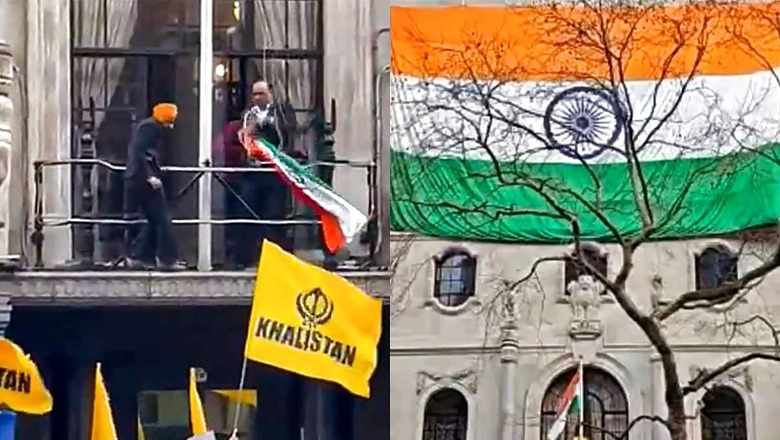
views
The latest incident of pro-Khalistan activists demonstrating in front of our mission in London, climbing to the balcony on the frontage of the building and removing the national flag, and breaking some windows as well, has happened because the UK authorities have not taken seriously our long-standing protests about allowing such demonstrations against the mission by local anti-India elements working together with those belonging to the Pakistani-origin Muslim community which has links with the Pakistani intelligence operatives in the UK.
The standard response to our protests has been that the UK recognises the right to protest and freedom of speech, and that by law, the UK authorities cannot ban such demonstrations. If so, what is the compulsion under law that such demonstrations with potential for violence must be staged in front of the mission and not at some distance away to eliminate the possibility of any violent action against our property and personnel? Why create a sense of siege in the mission, disturb its functioning, subject our officials to stress and expose them to offensive slogans, placards and abuse?
One can perhaps understand the compulsion of the UK authorities to allow a demonstration to give vent to strong public feelings if British citizens or vital interests have been subject to a major high-handed action in violation of international law in a foreign country. India has taken no such action against British citizens or interests. That the UK authorities gave permission to a pro-Khalistani rabble to protest in front of our High Commission without any Britishers or British interests being violated in India suggests that they see the Khalistani cause as a British cause. If not, what is the justification for allowing such a protest?
In defence of its position, the UK side uses the specious argument that what happens in India spills over into Britain because of diaspora connections. In other words, the UK believes it is compelled to interfere in our internal affairs because these impinge on theirs. The assumption behind this argument is that what happens in some internal matters in India is wrong and the British citizens are right to protest. How is it that these British citizens are extremist Sikhs, extremist Muslims of Pakistani origin with links to some Arab extremists as was seen in the case of the Leicester rioting, Pakistani-origin MPs who fuel the campaign against India on the Kashmir issue, and many Labour MPs in marginal constituencies that depend on the Muslim vote for their election? The British press is part of this anti-India campaign too.
How is it that this British argument does not work in reverse? In India, there are no demonstrations against the British High Commission even when demonstrations take place against our High Commission in London, or when India is attacked in the British parliament on Kashmir-related or minority and human rights issues with equivocal responses from government ministers. Britain gives shelter to many Indian businessmen who have been charged with major economic crimes and are fugitives from Indian law. There is no transparency about why Vijay Mallya’s extradition has been stalled, for instance. The British government refuses to clarify what the legal hurdle is despite the issue being raised strongly by India at the highest political level. British law is used as an argument to tell us that demonstrations against our mission cannot be banned. The same cover of British law is used to protect Indian economic offenders from Indian laws. Indians are not demonstrating against the UK High Commission in India for these provocations.
The UK Foreign Office Minister of State Lord Ahmad has called the action against our mission “completely unacceptable” and that the UK government will “always take the security of the Indian High Commission seriously”. This is neither here nor there as it is the UK’s responsibility under the Vienna Convention to provide security to foreign missions on its soil, apart from the fact that in the past and even now the UK government has not taken the security of our mission in the UK seriously. This has been pointed out in our own foreign ministry statement to the effect that India found the indifference of the UK government to the security of Indian diplomatic premises and personnel in the UK unacceptable. An explanation was demanded. This is a strong language. Using the word “indifference” shows the pent-up resentment in India against the manner the UK authorities have been unresponsive to our repeated concerns. India summoned the UK Deputy High Commissioner to lodge our protest in the absence of the High Commissioner. We have asked the UK government to take immediate steps to identify, arrest and prosecute each one of those involved in the incident.
Lord Ahmad’s statement does not identify the group that vandalised the mission and said nothing about arresting and prosecuting those responsible. The London police made light of the incident by stating that most of the protestors had dispersed before they arrived on the scene and that a man was arrested on suspicion of violent disorder. London is replete with CCTV cameras, so those participating in the demonstration should be easily identifiable, especially the person who climbed up to the balcony, removed our national flag and tried to replace it with a Khalistani flag. His photograph is available on social media No announcement has been made about his arrest. In this connection, it is regrettable that our own personnel who came out to the balcony to retrieve the flag removed by the intruder and prevent him from raising the Khalistani flag did not pull him inside from the balcony, detained and interrogated him before handing him over to the police. Our security staff cannot intervene outside the premises of the mission but has every right to detain a person who has trespassed into the mission.
It is most unlikely that the UK authorities will take any serious action, arguing that their laws do not allow this. They will also not want to open themselves to attacks by some parliamentarians, several anti-Indian lobbies, civil society activists and the media for seeking to abridge the right to peaceful protest, and that under pressure from the Indian government. The BBC mindset against India is quite widespread in the UK establishment. The latter is partial to the Sikh community for historical reasons, shows vulnerability to the demands of anti-Indian diehards in it for Sikhs to be classified as separate from Hindus, and appears reluctant to chastise the extremists in the community. This explains the latitude it has been giving to them in the UK.
This Khalistani contagion has already spread to San Francisco in the US and Canada and Australia as well. This requires strong steps by India to show our displeasure at this targeting of our missions abroad by separatist elements who are also involved in promoting violence in Punjab. They are a national security threat even if they are small in numbers.
Our government must identify these separatist elements, ban them from entering India, withdraw their OCI cards if they possess them, and confiscate their property in India by enacting necessary laws. The electronic visa facility could be denied to travellers from the UK, particularly as there is a problem of coordination between the Home Ministry and our missions abroad about undesirable elements not being allowed into India. To put pressure on the UK government to take condign action against the Khalistani elements we could, as things proceed, consider putting a hold on bilateral official and ministerial visits for the time being, including on FTA negotiations. This could cover the defence domain in particular in which the UK is interested, and for which a primary requirement is a relationship of trust. The Khalistani separatists cannot be separated from the totality of friendly India-UK ties.
Kanwal Sibal is a former Indian Foreign Secretary. He was India’s Ambassador to Turkey, Egypt, France and Russia. The views expressed in this article are those of the author and do not represent the stand of this publication.
Read all the Latest Opinions here



















Comments
0 comment